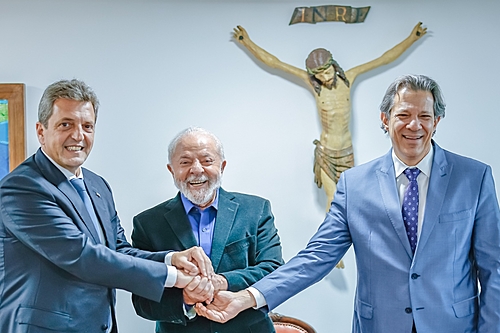
Brazil and Argentina created a mechanism to stimulate trade flow. Brazilian exports to the neighboring country, mainly food and car parts, will be guaranteed for US$ 600 million, as announced on Monday night (29) by Economy Ministers Fernando Haddad and Sergio Massa, after a meeting that included with President Luiz Inácio Lula da Silva (PT) in Brasília.
Guarantees are necessary so that exporters know that they will receive the amount owed, as payments are always made in installments. When the Brazilian exporter sells to Argentina, he will be paid by Banco do Brasil, which will receive a guarantee from CAF (Development Bank of Latin America and the Caribbean).
The way to guarantee these payments has been the subject of many debates and new proposals in recent times, many of them seeking to prevent the commercial procedure from being entirely done in dollars, especially when it involves countries with difficulties in obtaining reserves in dollars, as is the case of Argentina, which is going through a series of economic crises.
Haddad himself had announced, last week, the idea of structuring a smaller operation than the one announced now, something around US$ 140 million, which was based on guaranteeing Brazilian exports in yuan (Chinese currency). In this case, the exchange of yuans for reais would be done by Banco do Brasil in London.
However, what was announced yesterday is different. “It’s a path that everyone already knows”, says economist Giorgio Romano, professor at the Federal University of ABC and member of the Observatory for Foreign Policy and the International Insertion of Brazil (OPEB).
“The Argentines will buy Brazilian products in dollars, which is what Brazilian exporters want, with guarantees from Banco do Brasil and a counter guarantee from CAF,” he explained to Brazil in Fact.
The government creates alternatives, but companies are the ones doing the trading, they choose how they want to carry out the transactions. “And the vast majority of operators prefer the dollar”, says the economist, who sees this preference even more clearly among Argentines, who “do not trust the peso and want the dollar as security”.
Minister Haddad, assesses Romano, likes to think in an innovative way, but “then he needs to see where these ideas lead”. According to his evaluation, the proposal of commercial exchanges in yuan without a Chinese actor involved in any end of the transaction would be unprecedented in the world, but potentially risky in the sense of some exchange rate risk and lack of liquidity. “I don’t know what Banco do Brasil thought about it. But that idea is already off the table.”
Haddad himself, after the meeting with Massa, noted that the agreement announced on Monday tends to be more advantageous for the neighboring country than the previous proposal. “When Argentina has reserves in yuan to guarantee Brazilian exports, Argentina’s reserves officially decrease. (Now) Argentina, with the support of CAF, does not need to give up these reserves to guarantee exports”.
The agreement is also advantageous for Argentines from a commercial point of view, since the economies are integrated, explains Romano, and that is why it is interesting for Argentine businessmen to be able to buy the inputs they need in Brazil. “Brazil is very important for the Argentine market”.
To be ratified, the agreement still needs approval from CAF’s management board, which will meet on September 14th.
Reflections on the political dispute
Giorgio Romano also risks a political comment, saying that the agreement was a “goal” for Sergio Massa, who will be the government candidate in the October presidential elections. Last week, he managed to release another US$ 7.5 billion from the IMF (International Monetary Fund) and last Sunday, shortly before leaving for Brasilia, he announced a package of measures to improve the finances of millions of Argentine citizens. “He is positioning himself as the guy who does it”, says Romano.
Massa was third in the primary elections, behind candidates Javier Milei (far right) and Patricia Bullrich (right). Both accused the government candidate of populism for the measures announced on Sunday.
river fleet
After the meeting with Lula and Haddad, Sergio Massa pointed out that the conversation also addressed the increase in river exchanges between the countries, interrupted during the administration of Jair Bolsonaro, and the renewal of the São Borja (Brazil) – Santo Tomé (Argentina) agreement.
In July, the Brazilian government renewed the concession contract for the international bridge that connects the two cities, guaranteeing the regularity of operations and customer service at this important commercial hub. “The agreement allows us to continue managing the logistical facility in the area that handles 60% of bilateral trade”, reinforced Massa.
Editing: Rodrigo Durão Coelho
Source: www.brasildefato.com.br

